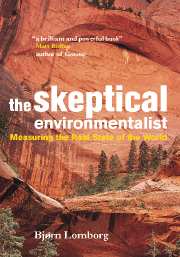Book contents
- Frontmatter
- Contents
- List of figures
- List of tables
- Preface
- Language and measures
- Acknowledgements
- Permissions
- Part I The Litany
- Part II Human welfare
- Part III Can human prosperity continue?
- Part IV Pollution: does it undercut human prosperity?
- 15 Air pollution
- 16 Acid rain and forest death
- 17 Indoor air pollution
- 18 Allergies and asthma
- 19 Water pollution
- 20 Waste: running out of space?
- 21 Conclusion to Part IV: the pollution burden has diminished
- Part V Tomorrow's problems
- Part VI The Real State of the World
- Notes
- Bibliography
- Index
20 - Waste: running out of space?
Published online by Cambridge University Press: 05 March 2013
- Frontmatter
- Contents
- List of figures
- List of tables
- Preface
- Language and measures
- Acknowledgements
- Permissions
- Part I The Litany
- Part II Human welfare
- Part III Can human prosperity continue?
- Part IV Pollution: does it undercut human prosperity?
- 15 Air pollution
- 16 Acid rain and forest death
- 17 Indoor air pollution
- 18 Allergies and asthma
- 19 Water pollution
- 20 Waste: running out of space?
- 21 Conclusion to Part IV: the pollution burden has diminished
- Part V Tomorrow's problems
- Part VI The Real State of the World
- Notes
- Bibliography
- Index
Summary
We often worry about all the waste piling up, wondering where it all can go. We feel that the “throwaway society” and its industrial foundation is undermining the environment. This fear is perhaps expressed most clearly by former vice president Al Gore, who is disturbed by “the floodtide of garbage spilling out of our cities and factories.” “As landfills overflow, incinerators foul the air, and neighboring communities and states attempt to dump their overflow problems on us,” we are now finally realizing that we are “running out of ways to dispose of our waste in a manner that keeps it out of either sight or mind.” The problem is that we have assumed “there would always be a hole wide enough and deep enough to take care of all our trash. But like so many other assumptions about the earth's infinite capacity to absorb the impact of human civilization, this one too was wrong.” Equally, Isaac Asimov in his environmental book tells us that “almost all the existing landfills are reaching their maximum capacity, and we are running out of places to put new ones.”
It is true that waste generation does increase with GDP. The richer we get the more garbage we produce. This can be seen from the World Bank’s analysis of waste per capita in relation to income, shown in Figure 113. The question is, of course, whether this is actually a problem. We may believe that garbage production is spiraling out of control and that landfill garbage is piling up to the extent that soon there will be room for no more, but that is simply not the case.
- Type
- Chapter
- Information
- The Skeptical EnvironmentalistMeasuring the Real State of the World, pp. 206 - 209Publisher: Cambridge University PressPrint publication year: 2001
- 1
- Cited by



